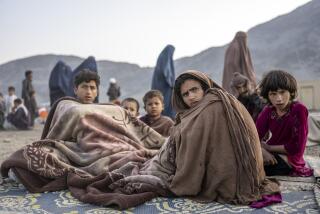Pakistan Calls Evidence Against Bin Laden ‘Sufficient’
- Share via
ISLAMABAD, Pakistan — In a significant boost from a key Muslim nation to the global anti-terrorism campaign, Pakistan officials said Thursday that “sufficient evidence” has been collected to link Saudi militant Osama bin Laden to the Sept. 11 attacks on the United States.
The announcement came after British Prime Minister Tony Blair revealed some of the first details of the international case against Bin Laden in a speech before Parliament in London.
Blair, who will be in Pakistan today, said at least three of the hijackers in the attacks on New York and the Pentagon have been “positively identified” as members of Bin Laden’s Al Qaeda network. One of the hijackers, Blair said, also was connected by the evidence to the 1998 bombings of U.S. embassies in East Africa and to the attack last year in Yemen on the U.S. destroyer Cole.
Pakistan’s position on the case against Bin Laden is critical to the U.S.-led anti-terrorism efforts. The Islamic nation shares a 1,400-mile border with Afghanistan, where the Saudi is believed to be hiding, and it is the last state to officially recognize the Taliban government.
On Tuesday, U.S. Ambassador Wendy Chamberlin presented a 20-page summary of evidence against Bin Laden to Pakistani President Pervez Musharraf. Pakistani officials said more documentation was delivered Wednesday night.
“We have seen the material that was provided to us by the American side,” Pakistani Foreign Ministry spokesman Riaz Mohammed Khan said Thursday. “This material certainly provides sufficient basis for indictment in a court of law.”
Privately, a senior Pakistani official was less restrained, describing the material as “impressive” and “weighty.”
In London, Blair presented to the special session of Parliament a dossier against Bin Laden, viewed by U.S. officials as the chief suspect in the Sept. 11 attacks, and the Taliban government that is protecting him.
However, Blair gave the lawmakers few details, saying evidence was withheld to protect the sources.
“We have absolutely no doubt that Bin Laden and his network were responsible for the attacks on Sept. 11,” Blair told Parliament, which had been recalled early to hear the case.
Blair went on to make the case that Bin Laden and his Al Qaeda network were able to carry out the attacks on the U.S. “because of their close alliance with the Taliban regime” in Afghanistan.
The Taliban, he said, provided Bin Laden with a safe haven in which to operate and allowed him to establish terrorist training camps, while Bin Laden provided the Taliban with troops, arms and money to fight the Northern Alliance forces of the Afghan opposition.
Pakistan has long been an ally of the Taliban. But since the attacks, the government in Islamabad has increasingly distanced itself from the regime. On Wednesday, Musharraf endorsed the idea of an alternative Afghan government composed of all the nation’s ethnic groups, including the majority Pushtun population, from which the Taliban gets most of its support.
Decisive Move Confers Status
The decisive move by Musharraf to join the U.S.-led coalition has won him newfound international status and the instant affection of the Bush administration.
“I see enormous opportunity coming out of this crisis,” said an American diplomat in Islamabad. “This has catapulted U.S.-Pakistan relations. We are now working very closely with them. Doors have been opened. Programs have begun. Some of the distrust is beginning to go away.”
Major creditor states, including Japan, the U.S., France and Germany, have opened negotiations to reschedule or forgive Pakistan’s billions of dollars in foreign debt. Next week, Pakistan Finance Minister Shaukat Aziz is to meet with U.S. officials in Washington to discuss further economic concessions, including greater market access for Pakistani products and help with the Pakistani national airline purchasing new or used aircraft.
In an interview, Aziz said the sudden flurry of economic concessions headed toward Pakistan should not be considered a quid pro quo for the government’s decision to join the anti-terrorist coalition. But the former New York international bank executive admitted that the timing for his trip could not be better.
“This is a defining moment for Pakistan politically,” Aziz said. “We have taken a bold stand.”
Though the Pakistani position has played well overseas, it is still unclear how it will be received by the country’s populace. That may become more evident today after the weekly prayer sessions in the nation’s mosques. In volatile periods, demonstrations and riots often follow Friday prayers.
Pakistan’s shift on the Taliban and joining with the American-led coalition has some prominent critics.
Former Pakistani intelligence chief Lt. Gen. Hamid Gul, who worked with the CIA in the 1980s to support Afghan rebels fighting the Soviet military, said popular support will collapse if the United States and its allies take direct military action inside Afghanistan.
“Everything is going to be shot to smithereens as soon as the Americans act,” said Gul, a devout Muslim who contends that the Taliban regime has brought peace and order to the war-torn country.
*
Tempest reported from Islamabad and Miller from London. Times staff writer Norman Kempster in Washington contributed to this report.
More to Read
Sign up for Essential California
The most important California stories and recommendations in your inbox every morning.
You may occasionally receive promotional content from the Los Angeles Times.












